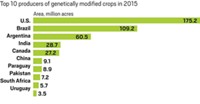Advertisement
Grab your lab coat. Let's get started
Welcome!
Welcome!
Create an account below to get 6 C&EN articles per month, receive newsletters and more - all free.
It seems this is your first time logging in online. Please enter the following information to continue.
As an ACS member you automatically get access to this site. All we need is few more details to create your reading experience.
Not you? Sign in with a different account.
Not you? Sign in with a different account.
ERROR 1
ERROR 1
ERROR 2
ERROR 2
ERROR 2
ERROR 2
ERROR 2
Password and Confirm password must match.
If you have an ACS member number, please enter it here so we can link this account to your membership. (optional)
ERROR 2
ACS values your privacy. By submitting your information, you are gaining access to C&EN and subscribing to our weekly newsletter. We use the information you provide to make your reading experience better, and we will never sell your data to third party members.
Agriculture
Funding for climate-friendly agriculture misdirected, EU audit finds
by Britt E. Erickson
June 26, 2021
| A version of this story appeared in
Volume 99, Issue 24

Greenhouse gas emissions from farming in the European Union have not decreased since 2010, despite the government spending over €100 billion ($119 billion) to combat climate change from agriculture between 2014 and 2020, a report by the European Court of Auditors concludes. The report finds that greenhouse gas emissions from the use of chemical fertilizers and manure in the EU rose from 2010 to 2018. Such emissions account for nearly a third of the EU’s agricultural greenhouse gas emissions, according to the report. The auditors claim that practices supported by agricultural funding that are intended to reduce fertilizer use, such as organic farming and growing legumes, have an unknown impact on greenhouse gas emissions. But other practices that have been demonstrated to reduce those emissions, such as precision agriculture methods that apply fertilizer only where it’s needed, have received little EU funding. Livestock emissions, which represent about half of agricultural greenhouse gas emissions, have remained steady in the EU since 2010, the report finds.




Join the conversation
Contact the reporter
Submit a Letter to the Editor for publication
Engage with us on Twitter